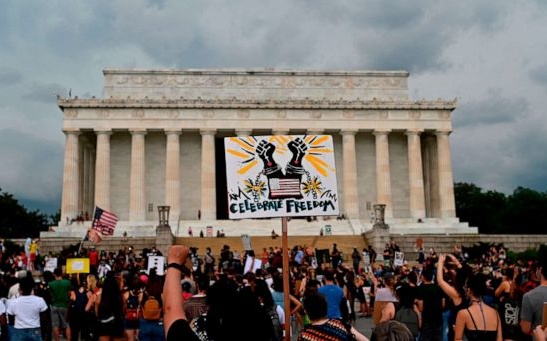A Juneteenth rally in front of the Lincoln Memorial, Washington DC (Andrew Caballero-Reynolds/AFP/Getty)
Written for America Unfiltered, a joint project of EA WorldView and The Clinton Institute, University College Dublin:
Steve Bannon, once Donald Trump’s White House strategist, says no one in the US is to blame for the May 25 murder of George Floyd.
Bannon spoke to the Asia Times about the killing that sparked Black Lives Matters marches across the US and the world, recycling disinformation and slander of Floyd:
The converging forces of Asia led to Mr Floyd’s current situation, his life, that he was sick. He had drugs in his system. He didn’t have a great job. And he was passing counterfeit money. All four of those come from Beijing, essentially.
The allegations are ludicrous, but this is not the unhinged anti-Chinese rhetoric of a former Trump official. Bannon is exploiting a phenomenon of US political culture: at moments of great domestic turmoil, Americans point a finger abroad.
Federal and state officials, Trump allies, and pundits blame external sources for the violence within. They feed the denial that the uprisings after Floyd’s homicide are part of the American fabric; instead, they are distorted into the opposite, the “un-American”.
This is both the reluctance to accept that racial violence is endemic to the American fabric, and the erasure of violence abroad as the consequence of US imperial interventions.
See also EA on Monocle 24: Black Lives Matter, Police Reforms, and Trump
How the US “Battle Space” Abroad Came Home
This is Not America
Many white commentators describe the current protests and the accompanying physical destruction and looting as a war zone. Meghan McCain described midtown Manhattan as a battlefield and lamented that “this is not America”.
In this deflective discourse, the war is never at home. Minneapolis, the site of Floyd’s murder, resembles Baghdad for these critics. Los Angeles resembles Beirut, Seattle has turned into Aleppo and Manhattan looks an awful lot like Fallujah.
Those taking part in the uprisings assume the role of terrorists occupying cities. Ted Cruz referred to protesters toppling a Columbus statue as the “American Taliban”. Robert J. O’Neill, a former US Navy Seal who fired the shots that killed Osama Bin Laden, likened American demonstrators to “ISIS, Al Qaeda, and the Taliban” in a viral tweet.
This assertions are Islamophobic and Orientalist in their equation of the Middle East with perpetual violence and unrest. They also ignore that the US has had a hand in conflicts in the region with the objective of creating a global security system, a sometimes thinly-veiled excuse to exert power in a region abundant in natural resources. US foreign policy has been dominated by interventions in the Middle East, and is in the midst of what critics have called a “forever war”, a transnational battle space that involves both overt and covert wars and intertwined “policing and security arrangements”.

